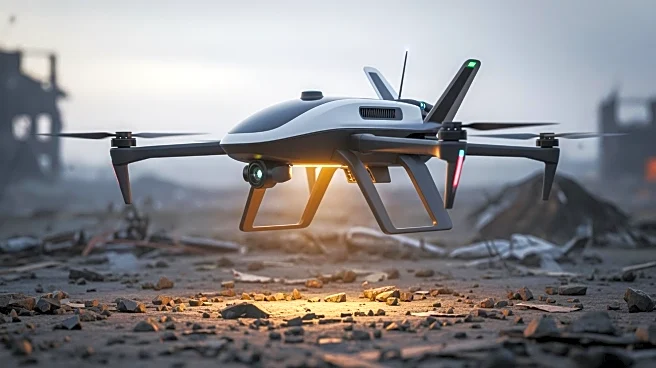What's Happening?
The ongoing conflict in Ukraine has seen significant advancements in drone technology, transforming modern warfare. According to a report by The Independent's world affairs editor, Sam Kiley, both Ukraine and Russia have developed sophisticated drone and robot
technologies that have necessitated a rewriting of traditional military rules. These advancements include the use of relatively inexpensive 'kamikaze' drones capable of destroying fortified troop positions and supply lines from a distance. Additionally, new 'ground drones'—small, remotely guided tracked vehicles—are being used to approach enemy positions undetected. The conflict has also seen the use of ultra-thin fiber optic cables to control drones, making them less susceptible to jamming. These technological innovations have had a profound psychological impact on soldiers and have been instrumental in recent military engagements, including the capture of Russian soldiers by Ukrainian forces.
Why It's Important?
The development and deployment of advanced drone technology in the Ukraine conflict have significant implications for global military strategies and defense industries. The ability to conduct remote operations with drones reduces the risk to human soldiers and can alter the balance of power in military engagements. This shift could lead to increased investments in drone technology by other nations, potentially changing the landscape of international defense spending. For Ukraine, these advancements provide a strategic advantage in their ongoing conflict with Russia, potentially influencing the outcome of the war. The psychological impact on soldiers and the ability to disrupt enemy supply lines and fortified positions highlight the transformative nature of these technologies in modern warfare.
What's Next?
As the conflict continues, it is likely that both Ukraine and Russia will further refine and expand their use of drone technology. This could lead to an arms race in drone capabilities, with other nations observing and potentially adopting similar technologies. The international community may also respond with new regulations or treaties concerning the use of drones in warfare. Additionally, the success of these technologies in Ukraine could prompt other countries to invest in similar capabilities, potentially leading to a shift in global military strategies.
Beyond the Headlines
The ethical implications of using drones in warfare are significant, raising questions about the nature of combat and the role of human soldiers. The ability to conduct remote operations with minimal human involvement challenges traditional notions of warfare and could lead to debates about the rules of engagement and the protection of non-combatants. Furthermore, the psychological impact on soldiers facing drone attacks could have long-term effects on military personnel and veterans.

















